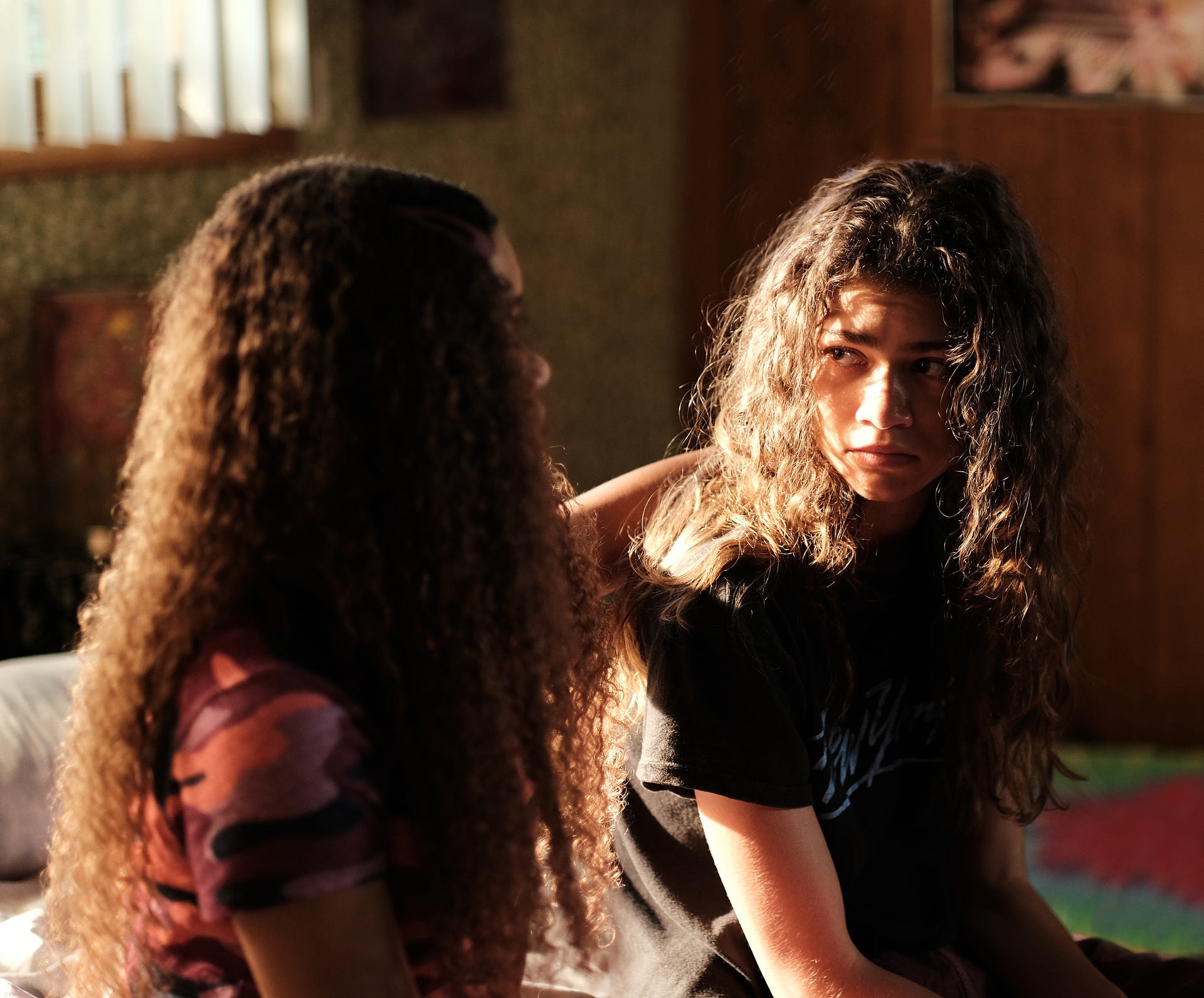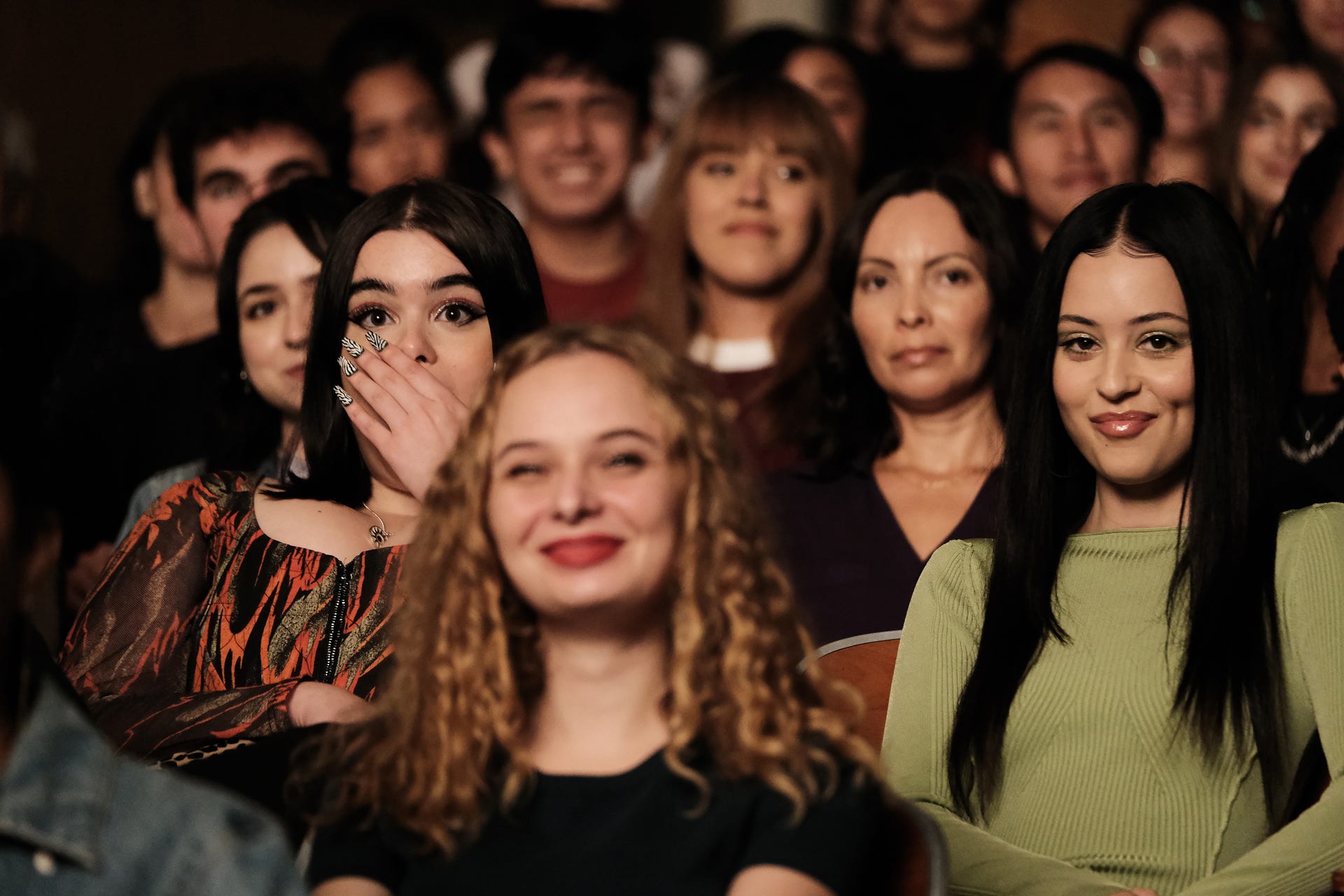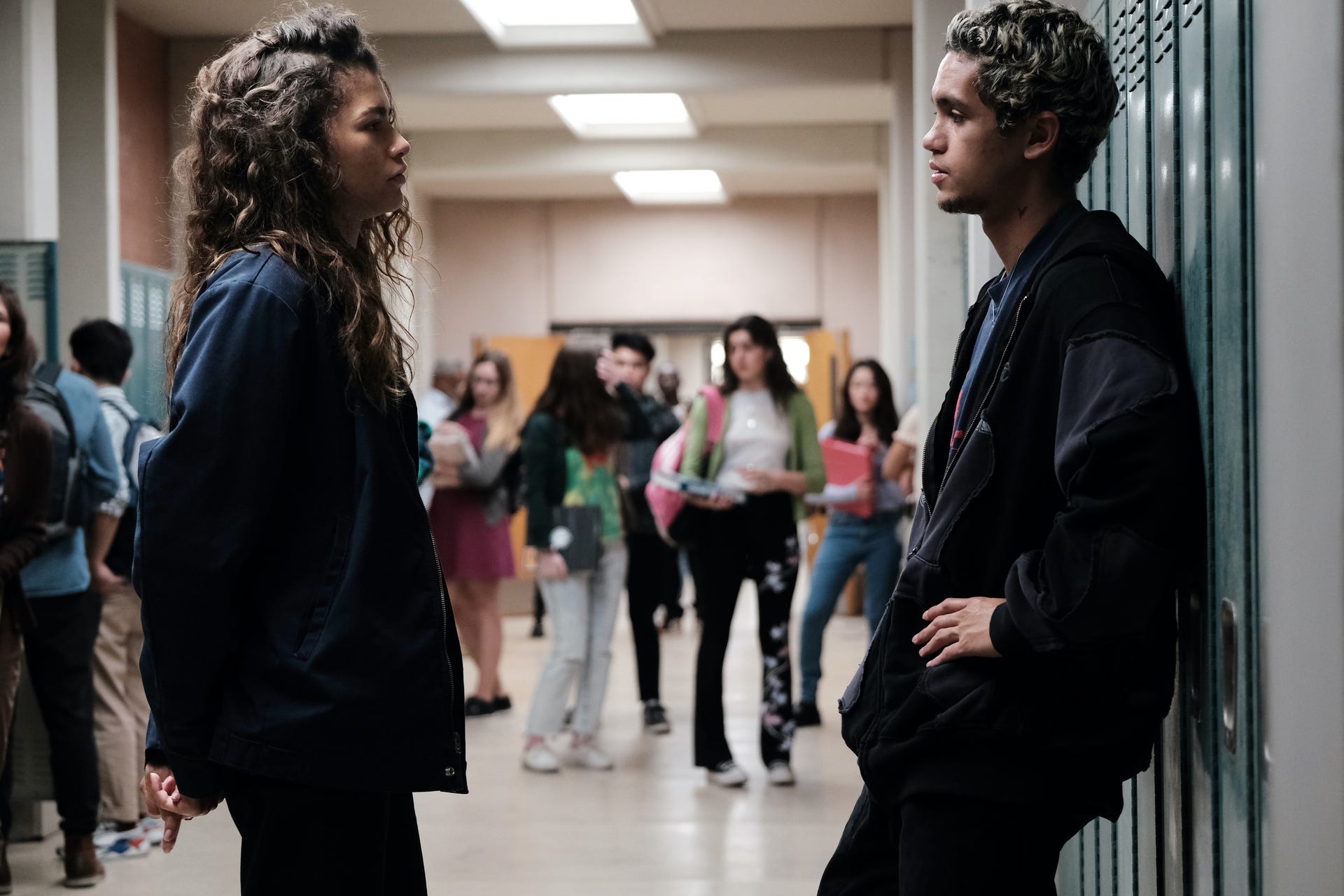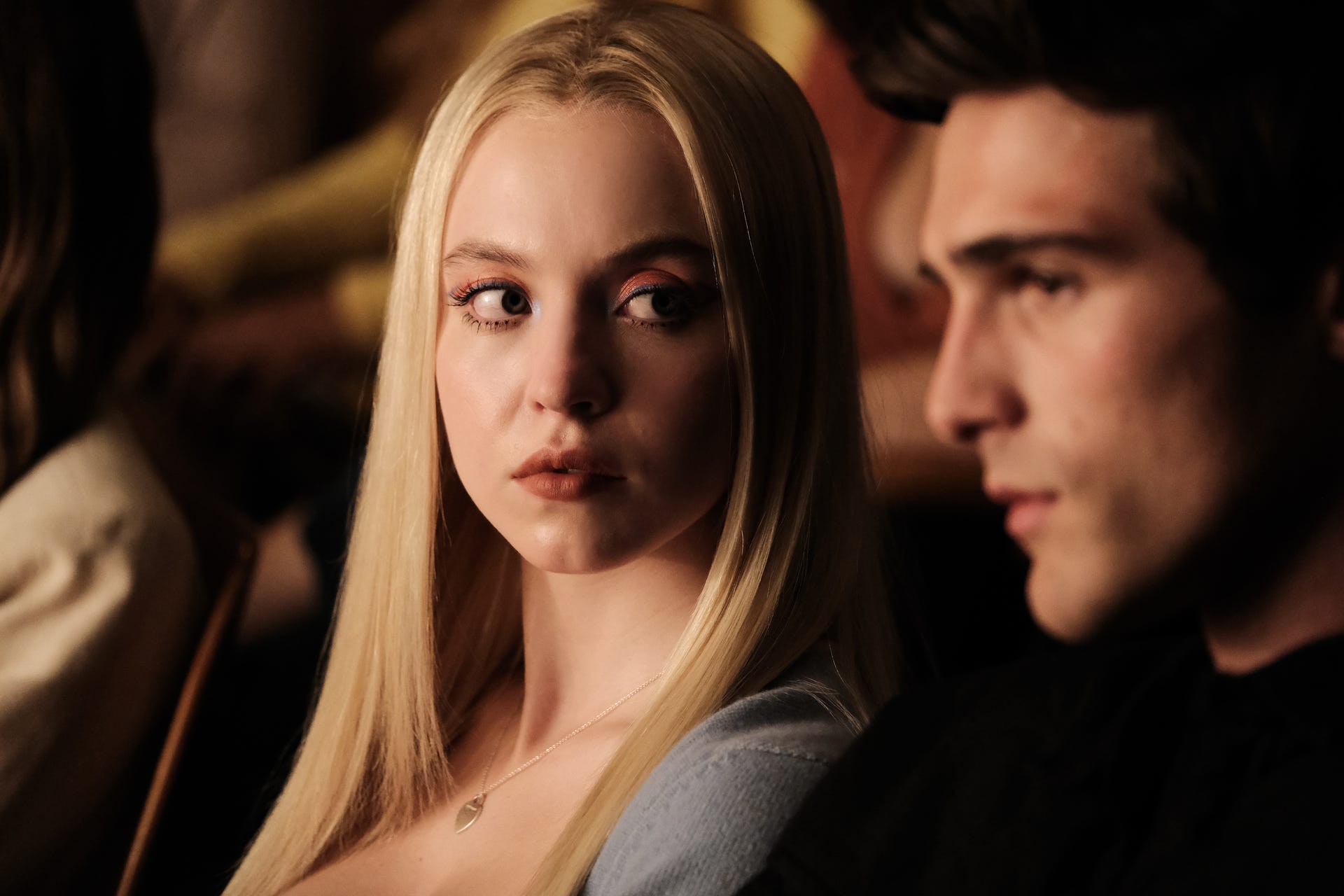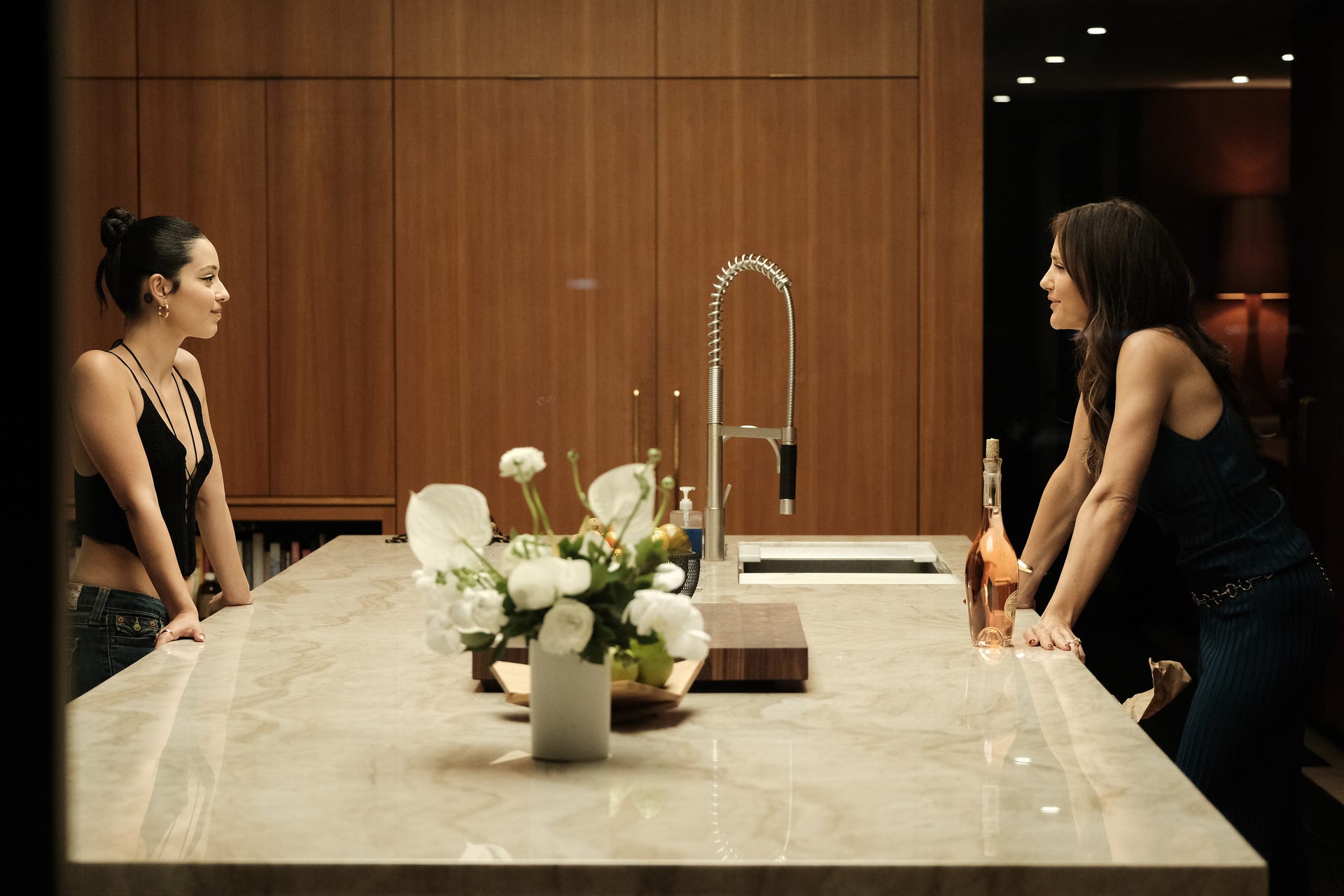Euphoria part II: a conversation
Ahead of the season 2 finale, I chat with Maya about the depiction of relationships in HBO's Euphoria.
This week’s newsletter is a continuation from the last, the final part in a short series of reflections on HBO’s Euphoria ahead of its season finale tonight. To open up the conversation, I Zoomed with my dear friend Maya Ayed, who has studied a lot of the topics that tend to surface wherever Euphoria is concerned — relationships, feminism, sexuality, media literacy. Maya and I were blessedly placed into a dorm together when we studied in London, and since then, we have enjoyed poring over these kinds of questions and controversies for five years of friendship. I am grateful to Maya for bringing her intelligence, generosity and insight to No Outlet this week.
Euphoria part I: spitting images
In my mid-teens, when I discovered the world of YouTube beauty vlogs, I was struck quite suddenly by a sense that somewhere along the line, I had erred from the lawful path. I was newly in high school and profoundly insecure; watching videos of girls my age a…
Tia: To start off, why do you watch Euphoria?
Maya: I saw this article in the New York Times about “doom watching” Euphoria, and I don't know if this is synonymous with what they're saying, but at the time I started season one, I was trying to work on my thesis, and it just felt like it was so dramatic to escape so fully into a show during such a stressful time, where I was also dealing with my own mental illness…. like, I just remember it pumping me up so much, and making me so happy and excited. And it was just nice to feel invested in something.
Tia: I remember it was the summer of 2019 — my first full summer in New York — and you and I were both kind of lonely… it was very hot in the city of course, and there is always this sad period in summer where you feel as though you’re supposed to be having this amazing time, but you’re working and tired and you just want to watch a lot of TV instead.
Maya: I was working Monday through Friday and I feel like it's a very big thing that the show premieres on Sunday. It just kind of feels like almost a way to avoid the Sunday Scaries. It's a fun way of extending the weekend, the last hurrah!
Tia: It's interesting you also say that like you feel like it was a good distraction from your schoolwork, because I feel that your studies would give really interesting insight into ways of reading the show. Can you talk about that?
Maya: Yeah, a big part of my studies had become about how young girls view women sexualised in media, and how that effects their growth. It was a new concept to me that there is a right time for certain age groups to be introduced to certain concepts. I just felt like I was being exposed to all these things that were wrong and it made me feel really small. So in this time, I was kind of actually trying to distance myself from bringing that lens to everything.
What really shaped my viewing, and continues to shape my viewing of Euphoria, is that I try to separate myself from a critical viewpoint, but as I told you, I'll encounter certain things that snap me back into it. Like hearing about how with Barbie, who plays Kat, there's rumours that there are problems between her and the director. I am reminded that sometimes there's real life harm to feigning ignorance. And so for me, there is this side thing going on about how to even approach watching a show like this.
Tia: I think holding those tensions is really interesting. I tend to just be such a grumpy cynic, haha. Whenever I express concerns about the show, I feel like such a nun!
I felt kind of called out by that episode this season where Rue addresses the camera, and she talks about how she has no intention of getting clean, and it is not the job of this show to give people hope. But at the same time, Levinson has said he wants Euphoria to be honest about addiction, so the next week, we get this really gruelling, intense episode showing Rue’s withdrawal and desperation, and how she nearly tears apart her family and herself (and other peoples’ families) because of addiction. And so it was weird to me in a way that the earlier episode, about media not having to be responsible, ended up being a red herring… and yet the choice to show the ugly side of things came up in another episode that aired a week later. So unlike watching a film, where we get all of these viewpoints in one sitting, in a TV show there is time in between, time in which people forget or lose interest or fail to see connections across episodes, and so the kind of glorious treatment of drugs or violence or what-have-you stands apart from the dangers of it, which I think makes it harder for people to hold these things together.
Something else that interests me are the charges of how the show ‘romanticises’ certain behaviours or types of relationships. And that word is compelling in part because of that suffix, which means to cause, so that romance is something applied to a pre-existing, inert, non-romantic thing. So I think maybe we need to ask the question of whether the show itself is doing the romanticising, or whether it’s representing some things that for a lot of people already feel romantic to begin with… I’d imagine that it’s both, maybe? But like I said, I’m kind of a nun compared to some of these kids so I’m coming at this from a pretty limited angle.
Maya: I feel like it's also important to bring up how when drugs are portrayed, they tie in with Rue’s struggle with mental illness, because I don't have a lot to say about drugs but I do find myself tending to like portrayals of mental illness that others will usually say is ‘romanticised.’ I guess what I mean is just that it feels like I need to see the romantic side of it in order to feel like it's okay. But I feel like maybe that's also a cultural thing where if something isn’t completely blown up to this aesthetic awesomeness, then it’s like it doesn't even exist.
Tia: Maya, that's really interesting and smart, and I'm glad you said it, because now I'm wondering if maybe there is something sort of inherently romantic about identification, and the practice of identifying with a piece of art, or another person.
Maya: I also feel that as an air sign not feeling very in touch with my emotions, it’s hard for me to draw the line between romanticising something and just feeling strongly connected with it, and I feel like that's very blurry for me…. and I don't think that's inherently a bad thing.
Tia: Right, although I think it is different than when we talk about the way that some teenagers or less mature audiences take to this show. I remember during season one, seeing people on the periphery of my life being really taken by Nate Jacobs and having this “I could fix him” take on his character, or thinking that this whole kind of tortured (and torturous) romance between him and Maddy was something that should be desirable. That really troubled me, and I don’t know if it’s a matter of the show not putting up enough guardrails, or audiences not being equipped to engage intellectually, or a combination of both.
Maya: Well, I was previously a die-hard Kat fan, and I feel like older groups — and by that, just like 20 and up, like us — would identify with her. But there would also be this post-feminist way of just emphasising like, empowerment through sexuality. So people in YouTube comments of scenes with her would be like, “Oh, my gosh! Kat is so confident! She had a huge turnaround!” I feel like some younger audiences missed the point that she's kind of ‘faking it ‘till you make it,’ and that's not the only way to gain that confidence. I think we're also still waiting for some kind of action that says that what she has been doing is also literally underage sex work. If you think about it in that way, I feel like those small nuances can get really blurred in an unhealthy way.
Tia: Yeah, I really like how you put that about the small nuances getting blurred, or maybe getting lost in the other stuff — like how Kat’s ‘empowerment’ also comes through a literal makeover and shopping spree, which is so neoliberal, or how they'll go from a scene where there's a lot of intra-personal reflection, to pick up on a scene of people like chasing each other with guns or something. How do you recalibrate your way of reading a scene from one to the other when they require such different emotional registers or viewing practices?
Something that we both enjoyed or thought was interesting or refreshing, was a couple of episodes ago, a scene between Kat and Maddie, where they were communicating about going through a little bit of a rough patch, and giving each other some advice and friendship. You had smart things to say about that.
Maya: I think we brought it up in the context of feeling really frustrated with the characters’ relationships with their parents in the show. That was a big thing that we thought was significant when thinking about younger audiences watching it and internalizing the social scripts of the show. They're viewing these characters experiencing all of these tough things and also not having any trusted adults in their life.
And so I feel like this scene [with Kat and Maddy] really stood out because we've also realized how little the characters even share with each other. There will be the voiceovers where we will hear how a character is really feeling, played during a scene where it looks like they're disclosing something, or it looks like they're confiding in their friend. But then, in the voiceover, we'll understand that they're actually feeling much different. They're just all internalising a lot of things that aren't really coming out, and it was really refreshing to see them act not like a caricature of who they are or not outwardly performative for their friends, but actually feeling like Kat and Maddie. Friends are there for each other — it's not just who they sit with at lunch, or who they do their makeup with. There's a trust there, and I feel like it's the trust that we have't really seen in the show much otherwise.
I follow the makeup artist, Donni Davy, on Instagram, and there was one scene — I totally forget the characters — but basically one of girls during Rue’s intervention had a similar eyeshadow colour that another character was wearing at Maddy's birthday, and so the makeup artist was saying that she liked to imagine them having all slept over Cassie's house, and the next day sharing their makeup palettes and getting ready together. I think that what the show is missing is those moments when they're interacting, not fighting for their lives, waiting for the next thing to blow up in their face, but actually what they do with each other. I thought that that moment was so sweet and also so far from me being able to imagine it. I don't know if that would completely change what the show is, but that's something that I find myself desiring.
Tia: Thank you for that really nice image — I want that too. I wonder in a way if this can segue too to the idea of how relationships on the show are founded. Like Maddy and Cassie have supposedly been best friends up to this point, but we rarely ever see them be kind to one another — they seem more associated on the basis of a compatible aesthetic. They’re the two “hot girls” in the school, so it looks right for them to be friends. And like I suggested last week, those aesthetic and social scripts seem to have sway over the ways that characters make choices. I wonder if Cassie and Nate’s relationship is similar in that way.
Maya: I honestly feel like their relationship feels the most high school. Maybe because they're both very lonely, and they both just want somebody there, and they're both available to be that person for each other. And it kind of just feels so situational in the way that high school relationships seem to develop. I also feel like something that really stood out to me in the last episode was when Cassie said something along the lines of just wanting to spend the rest of her life loving someone, and I feel like that's such a sweet and simple request to me. I was fighting for her in my head in this last episode, because I can just see exactly what she needs and what she wants. But she's in high school, and she's going about it the wrong way, and that's such a human thing for her to do. It doesn't excuse her actions, but it does make sense to me.
Tia: I am glad you said this, because it is really showing me how to be more generous to Cassie, and to people like Cassie, who I think I have a tendency to be way too hard on. And I also don’t think it also precludes us from understanding that this relationship still has a lot of toxicity, where both Nate and Cassie are not working through their trauma very well, and there is a major power imbalance, and so they’re coming at this relationship from a very severe angle.
Maya: I don't think there's anything inherently wrong with Cassie wanting the things that she wants. But, I don't think that she realises it takes a very particular partner to be able to be that person that can be loved by her, and not take advantage of her. And I like feel like that's where their relationship becomes toxic — he takes advantage of it.
In a different way, there's just something that feels so good about seeing someone who gets to like explode or implode… like, I find myself wishing not to be responsible for a day, or to just do what my innate feelings are. And there's something just so beautiful about when she’s throwing up in the jacuzzi, and her mom is having to pull her out. I feel like that [catharsis] is what I want with the show’s ending, and I feel like we're not gonna get it.
Tia: I want more complexity, more reflection, more actual character development, and sometimes that means more mess, yeah, but mess that is earned. As you’ve really pointed out, there are rarely moments when characters process — whether out loud or maybe with their bodies like that jacuzzi scene — what is going on with them. That’s why the Special Episodes were important, for me.
Maya: Yeah, because I feel like we've been tricked with all the flashbacks so that it’s like, “oh, maybe we do know about this person,” but it's in these specific dramatic scenarios. I have no idea what their motives are and that's what I actually want to know about, you know — why are they doing this?
Tia: Maya, I completely agree, but also if we go much further, the recording will be too large, so I think that we should leave on this question. It’s a helpful one. Thank you so much for sharing your intelligence with me! Enjoy the finale.
Thank you for joining No Outlet for this two-part edition all about Season 2 of Euphoria. You can find Part I, an essay on the rhetoric of images and looking, over here. I am looking forward to no longer thinking too much about this silly little show soon… but before that day comes, please feel free to sound off on the finale in the post comments.
What’s New:
Reading: Still working on Adriana Cavarero’s Inclinations, Alexis Pauline Gumbs’ Undrowned, and Claire-Louise Bennett’s Pond. I’ve mostly been focussed on trying to read more articles about the invasion of Ukraine to understand what is happening, the various systems of power in play, and the needs of the ordinary people at risk. It feels strange and unsettling to be reading or writing about other things, like all of this, to be honest.
Watching: I finished the final season of PEN15, which was okay. Sometimes that show is too much — it’s so honest — and sometimes it’s really wonderful. Not much to say about it, really, other than that the Wiccan and theatre episodes from last season were probably the apex of the series as a whole.
Listening: Alyssa Gengos’ brand new album Mechanical Sweetness! I met Alyssa two or three times in New York through mutual friends, and I’ve been so excited to see her music career take shape. “Gothenburg English” was my favourite song of 2021, and the album as a whole is unsurprisingly wonderful, new-wavey, contemplative, indie rock greatness.



